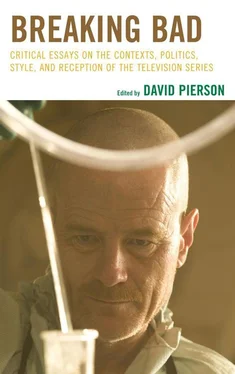Similarly, Toby Miller (2006) finds that though reality TV and news programming excel as models of commercialized entertainment and consumption, their depoliticized discourse does little to engage audiences with the serious problems confronting our world. Miller draws on examples from news coverage of the war on terror, food and weather coverage programming to reveal that audiences are narrowly viewed as individualistic consumers and denied access to the information they need as citizens. He asks why does the Weather Channel fail to cover the “everyday risks posed by global warming” and why does the Food Network ignore pressing health issues such as childhood obesity, genetically modified crops, and the fast food industry? The model of citizenship promoted by television’s news and reality programming is one that focuses on neoliberal individual choices and responsibilities, and is completely devoid of political or social issues. Likewise, Janice Peck (2008) maintains that “neo-liberalism’s defining political practice is precisely that of de-politicization.” Peck examines how Oprah Winfrey’s iconic rise and success on daytime television was due, in part, to the neoliberal social climate from which she emerged in the United States. Winfrey rebranded her daytime talk show away from “trash TV” to become the nexus of a positive, self-empowering therapeutic force for her regular TV viewers and devotees. Peck declares that Winfrey’s status as a cultural icon helped to construct and promote a neoliberal ideology among her devoted fans and followers.
A few scholars have explored neo-liberalism in fictional dramatic programming. Eric Beck (2011) investigates how the character of Omar Little in HBO’s The Wire both corresponds to, and departs from, the neoliberal demands of capitalism. Omar as a subject resides in the middle among a plethora of organizing stratum that includes the police, drug gangs, drug addicts, government, labor unions, teachers, and administrators. Beck shows that, with the exception of Omar and his band of renegade thieves, the series’ other characters (e.g., cops, criminals, addicts, politicians, teachers) are all circumscribed within the institutional bounds of neoliberal capitalism. Through its characters, The Wire illustrates how neoliberal capitalism effaces distinctions between work, life, leisure, love, and politics. Beck finds optimism in Omar’s flawed, but defiant character along with the fact that capitalism must rely on a subjectivity outside of itself in order to produce and reproduce its social relations.
Neoliberal discourses concerning social risk are present in the popular C.S.I. television franchise. Michele Byers and Val Johnson (2009) claim that C.S.I. , with its focus on forensic technologies to solve crimes, reinforces the notion that citizens have been abandoned by the state, especially the police and court system, and that risk is a part of everyday life. In most episodes, crimes are resolved less through litigation and sentencing than through the identification of the elusive ‘truth’ about the criminal and how he or she did it—which is often a moral lesson in the idiosyncratic nature of risk and the impossibility of protecting oneself from it. If lawyers and the police have failed us, C.S.I. reminds us that we still have the truth of the body which can only be made to speak for the victim by forensic science. Byers and Johnson find that C.S.I. represents the neoliberal concept of “governing through crime” because it accepts the notion that crime cannot be completely controlled and is the act of rational, calculating social actors (xv). Breaking Bad shares a similar conception of crime and criminality. Neo-liberalism, in general, refuses to acknowledge that the social is a realm that informs human action, like crime, and is the necessary domain for resolving social conflicts and finding solutions. This study examines how Breaking Bad exemplifies neoliberal discourses and policies in the areas of criminality and law enforcement, drug policy and enforcement, entrepreneurism, and public schooling.
NEOLIBERALISM, PUBLIC SCHOOLS, AND WALTER’S MALADIES
Public schools have always been at the center of neoliberalism’s project to create rational individuals who can compete in the marketplace along with refashioning the ways in which Western democracies function. Under Keynesian welfare policies, social injustices and inequalities are reduced through the intervention of government-sponsored social programs and the redistribution of resources and power within society. Under neoliberal post-welfare policies, social injustices and inequalities are the result of individual inadequacies, which cannot be solved by increasing individual dependency on social welfare, but rather by requiring individuals to become fully productive members of the workforce. Since employability and economic productivity are the main goals, there is less of a concern with producing a liberally well-rounded and civic-minded person through the educational system. Education serves the instrumental goal of developing the required skills and knowledge for a person to become an economically productive member of the workforce. David Hursh (2005) maintains that neoliberal governments seek both to reduce the overall public funding of education while at the same time reorganizing it to fit the needs of the economy. Neoliberal critics blame schools for society’s injustices and inequalities, while at the same time supporting taxation and reduction in social spending policies that exacerbate these inequalities. One recurring argument among these critics is to blame public schools for not providing enough skilled and well-educated workers for industry and the economy. This claim allows these critics to shift the responsibility for economic inequality away from corporations and politicians, and place it squarely on the educational system. Since public schools are the root cause for most social problems, educational reform efforts seem politically neutral, publically acceptable, and inevitable for the good of society (Hursh).
Hursh says that these educational reforms have been characterized by efforts to standardize the curriculum, to implement standardized testing to hold students, teachers, and schools accountable, to increase school choice and to privatize the public educational funding provision. Many social critics have pointed out the contradiction between these neoliberal reforms that promote competition and innovation between schools while at the same time limiting innovation through standardized curriculum and assessment requirements. Under George W. Bush’s No Child Left Behind (NCLB) Act, the state serves as the central regulator of education markets through its increased intervention in state education through curricular standards, testing, and funding. Public schools are no longer controlled at the local level, but rather through local decisions based on requirements of state and federal governments (Hursh).
With the state’s persistent intervention into local schools, many teachers feel constrained in their classrooms and wary of introducing any new teaching methods that may interfere with the continual practice of preparing students for standardized tests. These tests have become the instrumental measure of a teacher’s performance and a determinant in teacher promotion and retention. Teachers, for the most part, are restricted to teaching the standard curriculum and preparing their students for standardized evaluations. Henry Giroux (2010) points out that when educational reform neglects to connect learning to the public spheres of politics, critical thinking, and democracy, “it loses its hold on preparing young people for a democratic future and condemns them to a world where the only values that matter are individual acquisition, unchecked materialism, economic growth, and a winner-take-all mentality” (368). Under these reforms, the teacher’s role as an active, creative thinker is greatly diminished as they find themselves reduced to being mere cogs in a machine driven by an inflexible system of standardized testing and curriculum. It is not surprising that most teachers will feel undervalued and demoralized by these intrusive neoliberal educational reform and accountability efforts.
Читать дальше












